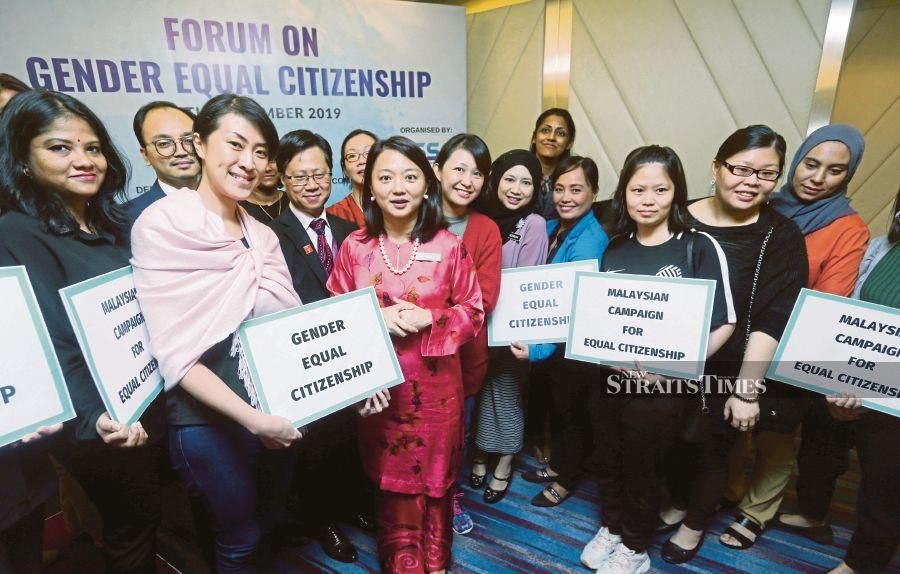Yeoh: 'It's 2019, treat men, women equally'

PETALING JAYA: The Women, Family and Community Development Ministry is making efforts to speed up the process of amending the Federal Constitution to enable Malaysian mothers married to foreign spouses get equal rights to confer citizenship to their children born abroad.
Deputy Minister Hannah Yeoh said her ministry was in talks with the Home Ministry and Foreign Ministry to resolve the issue as soon as possible.
According to Yeoh, the three ministries had been making the efforts since April. She, however, didn’t reveal a timeline on when Putrajaya would bring the matter to Parliament.
“Malaysian women giving birth overseas should be able to confer their citizenship on their children without having to apply, because men can automatically pass their citizenship to their children. It should be automatic for women too.
“It’s 2019 now, and both men and women should be treated equally.
“We are making efforts to expedite this because we want the Federal Constitution to read in such way that there is no gender discrimination,” she said at the Malaysian Campaign for Equal Citizenship forum held by Foreign Spouses Support Group (FSSG) here, yesterday.
Yeoh also pointed out that prior to the 14th General Election, Pakatan Harapan had made a promise in its manifesto to review all laws relating to gender equality.
Commitment 4 of the manifesto stated that the PH government would ensure the legal system protects women’s rights and dignity.
The New Straits Times met two women at the forum who could not get Malaysian citizenship for their children.
Naveena Somasundram, 35, said she was now stuck in the country with her 18-month-old son without her eldest son and husband, who were in France.
Her husband is a refugee seeking asylum in France, and according to French law, a child must receive the citizenship of the other parent if he was stateless.
Naveena wants Malaysian citizenship for their children.
Her second son had yet to receive citizenship while his elder brother had received his three years ago.
“When my father fell ill last year, I returned to Malaysia with my newborn son, who didn’t have a passport. I went to the Malaysian embassy in France and they gave me an emergency travel document so that he could enter Malaysia with me.
“The travel document states that ‘the bearer of this document is a Malaysian citizen’ but it’s been over a year now and my son has yet to received his citizenship,” she said.
“Right now, my baby is stuck here and not able to travel back to see his brother and father because he doesn’t have a passport since he is not recognised as a Malaysian, although his mother is a Malaysian.
“Since last year, I’ve only been able to see my eldest son in France twice, and each time I had to leave my baby with my 72-year-old mother.
“How can you separate a breastfeeding child from his mother? And my eldest son is starting school soon but I won’t get to see his first day,” Naveena added.
FSSG is currently helping 34 other mothers with citizenship problems. It is kicking off the campaign to reach out to others with a similar issue.
Another Malaysian mother who wanted to be known only as Mala, 45, said her eldest son, who was also born in France, was currently living in Malaysia under a student pass.
Mala had been trying to get citizenship for him for years, but was rejected without a proper explanation.
She found solace in Petaling Jaya member of parliament Maria Chin Abdullah, who had been sending letters and helping Mala to make an appeal.
“After being rejected the first time, my son’s application is currently being reviewed again, thanks to Maria, but I still haven’t received any answers yet from the Home Ministry.
“Right now, my son is staying in Malaysia under the student pass since he’s studying at an international school. That’s the best I can do for him.
“If this problem continues, there will be more foreigners and fewer Malaysians. We will keep losing Malaysian professionals and voters too.”
Malaysian mothers married to foreign spouses want the equal right to confer citizenship on their children born abroad.
They contend that if a Malaysian father can confer his citizenship on his children, the mother should also be given the same right as she gave birth to the children.
Women’s rights advocate Ivy Josiah, who is the campaign adviser, said the programme would continue until it reached its goal of helping Malaysian mothers who could not pass on their citizenship to their children.
She also urged the government to keep its election promise by speeding up the amendment.
“Clearly these colonial legacy laws reinforce the false, patriarchal notion that children must follow the father’s citizenship.
“The present provisions do not reflect the real lives of Malaysian women who have international marriages, study or work overseas and give birth abroad.
“It’s an old-fashioned, unnecessary and outdated provision that is no longer relevant,” she said.
From 2013 to last year, there were 111,142 applications for citizenship under the National Registration Department.
Of that, 26,222 applications were rejected, 54,223 were being processed, 6,371 were cancelled and 24,327 have been approved.
